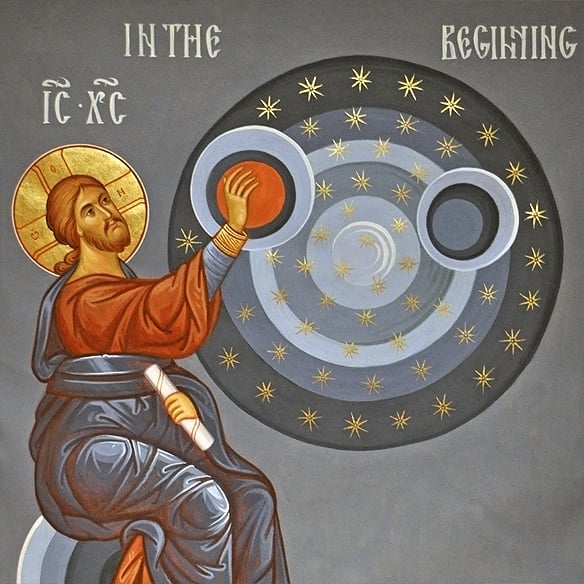The Theology of Gender – 1. The Story of Creation
16 March 2017The story of creation presents the basic principles of human life and behavior. It is the main reference for the Christian understanding of humankind’s existential questions. In the book of Genesis, the unique relationship between humans and their Creator unfolds. Inside it, the mystery of the purpose of this world is hidden, as is the destiny of our existence.

According to Genesis, God created everything in this world to be in the service of His beloved creature, the human person. Humans are the purpose of the whole of creation. God created the perfect environment for His most precious creature and wanted to share with it His Divine life. Creation of humanity is a special creative act of God that was made in steps[1] in contrast to the creation of all other things, which was performed immediately, with just one word. The importance of man’s creation is indicated by the fact that this act is preceded by a divine thought according to which man is created after God’s image[2]. Nothing else in the story of creation is comparable with the special care that the Creator took for His beloved creature.
The account of Genesis, which is the primitive history of human destiny in all ages, has been interpreted in so many different ways, with strengths and weaknesses in each point of view. Despite the method of examining the text – linguistic, historic, theological, sociological etc. – and trying to be fair to the text, when the author refers to the principles of human life or human characteristics in general, he uses the word ἂνθρωπος (human) without gender distinction. Thus, we learn that humanity (ἂνθρωπος) was created in the image and likeness of God, and was created with gender bipolarity[3]. He[4] was made out of dust, and received God’s breath into his nostrils[5]. God put His creature into Paradise and asked that he protect and cultivate it[6]. God then commanded Adam that they[7] not eat from the tree of “knowing good and evil” because doing so will cause death[8].
In a second account of creation, a detailed description of the creation of woman from the side of Adam[9] is provided. The creation of woman was also preceded by a divine thought: Adam should not be alone; God will give him a helper[10]. This helper, according to some interpreters, reflects God’s will to assist His creature and must be seen as divine providence and care for His creation[11]. Nevertheless, for others, the word “helper”, together with the expression “according to him” (κατ᾿ αὐτόν), is interpreted as a means of supporting the opinion that woman was created to meet man’s needs. This suggestion is not faithful to the text because in the Scripture the word “helper” can be used to refer to someone superior (God, angels), inferior (animals), or equal (another human being) to the human person in need of help[12]. Accordingly, now woman must be seen as a helper to man of the same rank[13] and both share the responsibility to work together. This view is supported by the text itself, since Adam was looking for a helper who would be the “same” as him (ὃμοιοs)[14] among the living creatures that God brought before him. The same interpretation is given by St. John Chrysostom[15] who wrote extensive commentaries on Genesis as well as on marriage.
[1] See more in E. Pentiuc, Jesus the Messiah in the Hebrew Bible, (Mahwah, 2006), 5.
[2] «καί εἶπεν ὁ Θεός΄ποιήσωμεν ἂνθρωπον κατ΄ εἰκόνα ἡμετέραν καί καθ’ ὁμοίωσιν» Gen 1:26.
[3]«..καί ἐποίησεν ὁ Θεός τόν ἂνθρωπον, κατ’ εἰκόνα Θεοῦ ἐποίησεν αὐτόν, ἂρσεν καί θῆλυ ἐποίησεν αὐτούς» Gen 1: 27.
[4] “He” does not refer to the male gender, but expresses the masculine word “ἂνθρωπος”, which refers to all humans.
[5] «καί ἒπλασεν ὁ Θεός τόν ἂνθρωπον, χοῦν ἀπό τῆς γῆς, καί ἐνεφύσησεν εἰς τό πρόσωπον αὐτοῦ πνοήν ζωῆς, καί ἐγένετο ὁ ἂνθρωπος εἰς ψυχήν ζῶσαν» Gen 2:7.
[6] «Καί ἒλαβε Κύριος ὁ Θεός τόν ἂνθρωπον, ὃν ἒπλασε, καί ἒθετο αὐτόν ἐν τῷ παραδείσω τῆς τρυφῆς, ἐργάζεσθαι αὐτόν καί φυλάσσειν» Gen 2:15.
[7] Changed to plural because the reference is both to man and woman.
[8] «καί ἐνετείλατο Κύριος ὁ Θεός τῷ Ἀδάμ λέγων’ ἀπό παντός ξύλου τοῦ ἐν τῷ παραδείσω βρώσει φαγῇ, ἀπό δέ τοῦ ξύλου τοῦ γινώσκειν καλόν καί πονηρόν, οὐ φάγεσθε ἀπ’ αὐτοῦ’ ᾓ δ᾿ ἂν ἡμέρα φάγητε ἀπ᾿ αὐτοῦ, θανάτω ἀποθανεῖσθε» Gen 2:16-17.
[9] «καί ἒλαβε μίαν τῶν πλευρῶν αὐτοῦ καί άνεπλήρωσε σάρκα ἀντ᾿ αὐτῆς. Καί ᾠκοδόμησεν ὁ Θεός τήν πλευράν, ἣν ἒλαβεν ἀπό τοῦ Ἀδάμ, εἰς γυναῖκα καί ἢγαγεν αὐτήν πρός τόν Ἀδάμ» Gen 2:21,22.
[10] «Καί εἶπε Κύριος ὁ Θεός΄οὐ καλόν εἶναι τόν ἂνθρωπον μόνον΄ποιήσωμεν αὐτῷ βοηθόν κατ᾿ αὐτόν» Gen 2:18.
[11] Pentiuc, Jesus the Messiah, 15.
[12] Theodosios Haralampopoulos, Περί της Θέσεως της Γυναικός Έναντι του Ανδρός κατά την Ορθόδοξον Χριστιανικήν Εκκλησίαν καί περί Φόβου Θεού (Αθήνα: 2004), 7-9.
[13] This is what is meant by the expression “κατ᾿ αὐτόν”.
[14] «τῷ δέ Ἀδάμ οὐχ εὑρέθη βοηθός ὃμοιος αὐτῷ» Gen 2:20.
[15] «…Τό μέλλον δημιουργεῖσθαι ζῶον τοῦτό ἐστι περί οὗ ἒλεγε΄ “ποιήσωμεν αὐτῷ βοηθόν κατ᾿ αὐτόν”, ὃμοιον αὐτῷ φησι, τῆς αὐτῆς αὐτῷ οὐσίας, ἂξιον αὐτοῦ, μηδέν αὐτοῦ λειπόμενον…Οὐκέτι γάρ εἶπε “ἒπλασεν” ἀλλ᾿ “ᾠκοδόμησεν” ΄ἐπειδή ἐκ τοῦ ἢδη πλασθέντος τό μέρος ἒλαβε ΄καί, ὡς ἂν εἲποι τις, τό λεῖπον ἐχαρίσατο…καί τέλειον καί ὁλόκληρον καί ἀπηρτισμένον κατασκευάσαι, τό δυνάμενον καί προσδιαλέγεσθαι καί τῇ τῆς οὐσίας κοινωνία πολλήν αὐτῷ τήν παραμυθίαν εἰσφέρειν» “Εἰς Γέν., Ὁμιλία ΙΕ” PG 53, 120-122.






